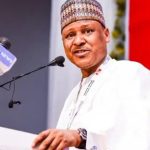By Sami Tunji
The former President of Nigeria, Muhammadu Buhari, failed to sign the Nigeria Data Protection Bill again despite World Bank’s funding and stakeholders’ support.
In September last year, The PUNCH reported that the Project Coordinator, Nigeria Digital Identification for Development, Solomon Odole, disclosed that the financiers of the Nigeria Digital ID4D Project made the enactment of the data protection law a prerequisite for the release of identity funds.
The financiers for this project include the World Bank, the French Development Agency and the European Investment Bank.
He made this disclosure during a workshop on the draft Data Protection Bill for members of the ICT and Cybersecurity Committee of the National Assembly in Abuja.
He said, “One of the major tasks of the project is to strengthen the legal and institutional framework, which has to do with our laws and regulations, in which data protection is actually key.
“The data protection law or enactment is a disbursement condition of the project. It simply means we cannot do certain things, like explore the area of identity, until the data protection law is enacted. It is as a result of this that our financiers, the donors to this project, the World Bank, French Development Agency and the European Investment Bank have made data protection as a disbursement condition. So, it is a condition that has to be fulfilled before the release of funds for identity.
“That is why we have been working with the Nigeria Data Protection Bureau to see how we can work together to ensure the enactment of this bill.”
He further stressed the need for collaboration among all relevant stakeholders to ensure seamless enactment of the data protection law.
In February 2020, it was reported that Nigeria’s digital identity ecosystem project, along with five others, had been approved by the World Bank.
The approved projects, valued at $2.2bn, were aimed at assisting the country to empower citizens, especially marginalised groups, to access welfare-enhancing services.
The national digital identity ecosystem project was designed to enhance the national Identity system’s legal and technical safeguards to protect personal data and privacy.
Among the projects approved was the Nigeria Digital Identification for Development Project.
This project was to be financed through the World Bank’s International Development Association credit of $115m alongside co-financing of $100m from the French Agency for Development and $215m from the European Investment Bank.
Checks by the PUNCH showed that $23,000 was released for consultancy services to facilitate policy discussions related to the Data Protection Bill.
Sunday PUNCH also noted that $296,400 was budgeted from the loan for consultancy services to facilitate consultative and advisory sessions with members of the National Assembly towards the passage of the Data Protection Bill.
Nigeria’s Federal Executive Council approved the Nigeria Data Protection Bill (2022) and transmitted it to the National Assembly for consideration.
The Nigerian Senate announced on Twitter on 3 May 2023 that Nigerian Data Protection Bill had passed its third reading.
The Bill was sent to the House of Representatives to be considered. Once passed, it was to be sent to the president to sign.
However, the bill is yet to be passed into law as the country takes on a new administration.
A source in the Nigeria Data Protection Bureau told our correspondent that the Bureau would soon approach the new administration to ensure that the bill is eventually passed.
According to the source, “we want the new guys to settle in first and push things again. Our people are working on it, and we hope things will work out fine.”
Source: The Punch







